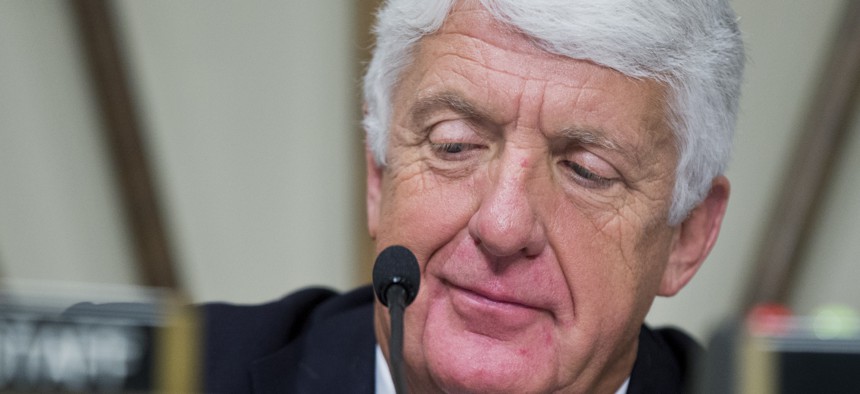A New U.S. House Task Force on Intergovernmental Affairs Begins Its Work

U.S. Rep. Rob Bishop, R-Utah, presides over an oversight hearing on Capitol Hill in Washington in 2016. Manuel Balce Ceneta / AP Photo
“It should have happened 50 years ago,” U.S. Rep. Rob Bishop, the Utah Republican who is leading the bipartisan panel, said of the effort the task force is undertaking.
WASHINGTON — The Republican lawmaker leading a new congressional task force charged with examining the balance between federal power and state and local government interests says he does not want the group to get tangled up in disagreements over funding and policy.
Instead U.S. Rep. Rob Bishop, of Utah, said he’d like the panel of U.S. House lawmakers to focus on procedures that could afford states and localities more say in decision-making processes. He is chairing what’s called the Speaker’s Task Force on Intergovernmental Affairs.
House Speaker Paul Ryan and House Minority Leader Nancy Pelosi announced the formation of the task force last month and it met for the first time on Thursday.
“If we get bogged down in money matters and policy issues, we're never going to achieve anything,” Bishop told Route Fifty after the meeting. “This task force has to talk about procedures, so that future decisions are made locally and at the state level.”
“If you're asking me about specific budget cuts, the committee will break down,” he added.
On Thursday, representatives from the National Governors Association, the National Association of Counties, the National League of Cities and the Council of State Governments appeared before the task force. Those organizations—along with the National Conference of State Legislatures, the U.S. Conference of Mayors and the International City/County Management Association—are serving as an advisory council to the group.
Lawmakers on the task force include Bishop, six other Republicans and six Democrats.
Some of the panel’s goals are to examine the effects of federal rules and regulations on state and local governments and to “develop proposals to partner with and empower states, tribes, local governments, private institutions, families and individuals.”
Ryan delivered remarks at the outset of Thursday’s meeting.
“Government works best when it works from the bottom up,” he said. “But in recent years, the principle of federalism has slowly eroded under an overreaching federal government.”
“There’s no question that we can work better, as partners, with state, local and tribal leaders,” he added.
Scott Pattison, CEO and executive director of the National Governors Association, during his remarks to the task force, recommended, among other things, that the panel consider new ways for states to provide input on federal actions.
“We favor, very strongly, the preservation of state sovereignty when our federal partners legislate or regulate activity in the states and localities,” Pattison told the lawmakers. He added: “Federal action should be limited to problems that are truly national in scope.”
National Association of Counties President, Bryan Desloge, a commissioner in Leon County, Florida, described how with a problem like the rise of opioid addiction in parts of the nation, county governments are on the front lines—operating 911 dispatch centers, emergency response agencies, hospitals, jails and drug abuse treatment services.
Desloge also highlighted concerns among county officials that Congress is focusing “primarily on federal budget impacts” and shifting costs down to states and localities.
U.S. Rep. Gerry Connolly, a Virginia Democrat, pointed out that tensions can arise between states and local governments and said that issuing federal block grants to states and letting them decide how to use the money “is not the answer.”
He also echoed Bishop’s perspective on how the task force should proceed with its work. “I urge this group,” Connolly said, “to avoid big ideological battles and look at some practicalities that would make life easier and more streamlined.”
Asked if there was anything about the Trump administration that made this an opportune time to reexamine the federal government’s relationship with states and localities, Bishop replied: “Not necessarily, other than the fact that we're starting fresh on a lot of different issues.”
"It should have happened 50 years ago,” Bishop added, referring to the effort the panel of lawmakers is undertaking. “There's not going to be a better time than the present."
The congressman said he was uncertain when the task force would wrap up its work.
Bill Lucia is a Senior Reporter for Government Executive’s Route Fifty and is based in Washington, D.C.
NEXT STORY: New York and Texas Enact Laws to Curb Child Marriage






